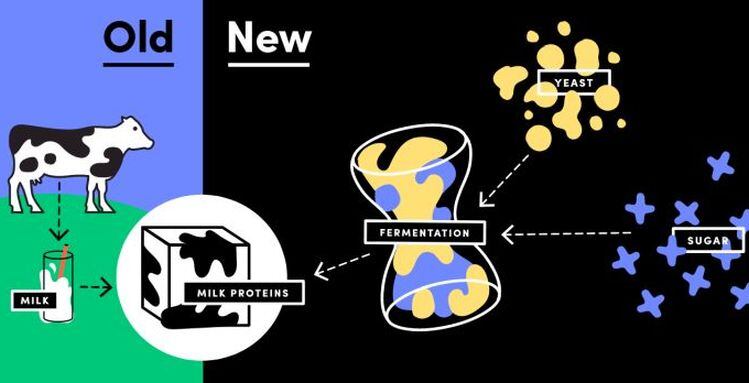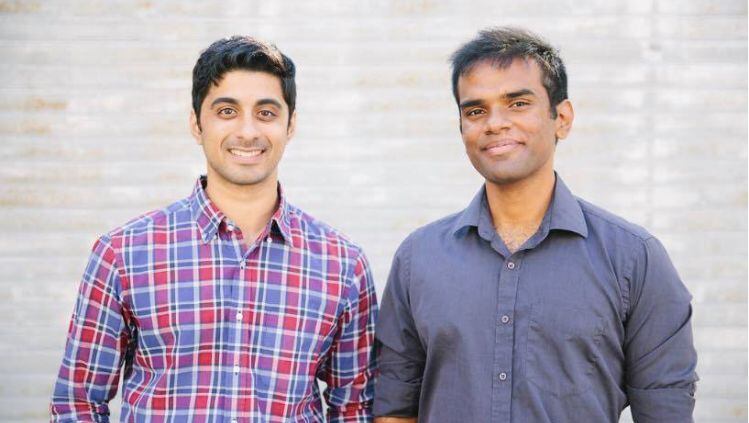The brainchild of Ryan Pandya and Perumal Gandhi – who have just raised $24m to commercialize their animal-free proteins - Perfect Day takes a micro-organism, and adds DNA sequences (which can be 3D printed using synthetic biology techniques) which effectively instruct that microbe to produce the proteins found in milk: predominantly casein (Perfect Day is making four different caseins that make a micelle) but also lactoglobulin and lactoalbumin, the two proteins that form the bulk of whey protein in milk.
It then throws them into big fermentation tanks with sugar and other nutrients to feed on and sits back while they get to work.
Animal-free dairy?
But how should we talk about them? They’re vegan in the sense that no animals were involved in their production, and they are dairy proteins in the sense that they are the same as the proteins produced by cows, Pandya told FoodNavigator-USA at the IFT show in Chicago. But is ‘animal free dairy’ something consumers can get their heads around?
“We’re doing a lot of work this year to figure out the right ways to talk about this that minimize any confusion that people have,” explained Pandya, who describes fermentation “as the ancient art and science of converting nutrients from one form to another… People think it’s dairy and people think it’s non-dairy, and in reality it’s a little bit of both… “
When it comes to the specific ingredients (whey protein, casein), there’s a lot less confusion over terminology, he argued: “Citric acid is called citric acid whether it’s from a lemon or from biotechnology.”
But how would a food marketer talk about Perfect Day’s wares collectively to consumers?
“Collectively I would call them animal free dairy proteins, but people might fight me on that,” said Pandya.
“There’s a need to differentiate between milk which is from an animal, and dairy, which I would say refers to the identity of those ingredients. For example, whey protein is also a dairy protein, regardless of where it came from.”
The timetable
So when might the first animal-free dairy proteins hit the market?
Perfect Day is “talking to companies big and small about doing launches as early as next summer or in the coming years, much much bigger launches,” said Pandya. “For the first scale up, we are working with a large established manufacturing partner.”
The GM factor: We’re committed to transparency
Asked about how the new federal GMO labeling legislation [the details of which are still being thrashed out by the USDA] might impact the company, he said: “We’re committed to transparency, so no matter what that legislation requires, we’ll be disclosing that the proteins are made using genetic engineering even though they are free from GMOs (genetically modified organisms).”

Perfect Day dairy proteins are cleaner, greener and kinder than those produced via industrialized animal farming, claims CEO Ryan Pandya, but they also represent a new supply of animal-free proteins that deliver the unique functionality and nutrition of dairy so that formulators do not have to compromise.

Potential applications
As for potential applications of Perfect Day’s ingredients, he said: “I’m most excited about things you and I would recognize as fresh dairy products such as cheese, yogurt and ice cream, but what we’ve learned is that dairy ends up in many more places than just the fresh dairy case, pretty much any aisle of the grocery aisle you can think of, there is dairy in there.”
He added: “We’re looking at opportunities to replace dairy ingredients in applications already using dairy, and we’re also looking at opportunities to make plant-based products better… but there’s also a third category, because we’re making these proteins individually we’re actually able to explore a wider functionality space than what you can do with a set ratio of proteins that you find in cow’s milk. So we’re figuring out what these proteins can do to bring new experiences and functionality to food…”
